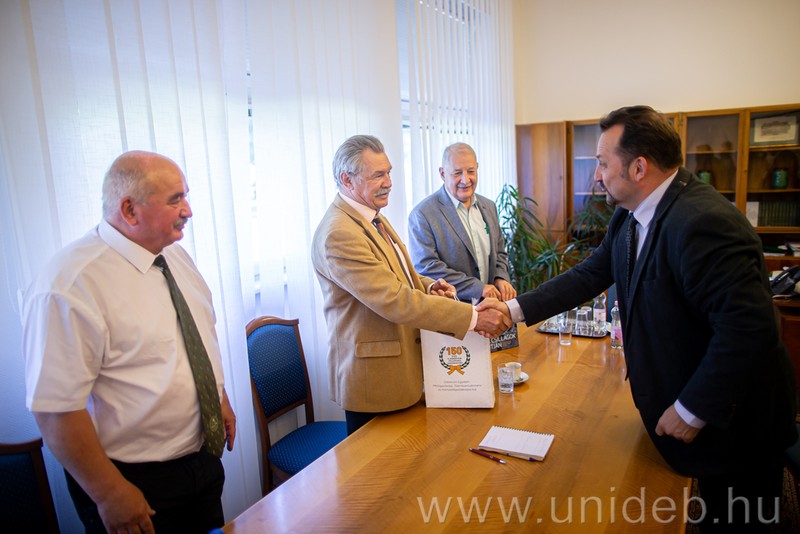As a guest of Mezőgazdaság-, Élelmiszertudományi és Környezetgazdálkodási Kar [Faculty of Agricultural and Food Sciences and Environmental Management], this time, he learned about the specifics of the space research program introduced at our university.
The first ever, and hitherto only, Hungarian cosmonaut conducted a series of experiments during the course of his journey way back then that lasted for exactly 8 days, 20 hours and 45 minutes. Following that space flight, a number of scientific tests had been initiated also at the University of Debrecen on the samples collected by the cosmonauts, as Bertalan Farkas recalled.
“The 21st century is going to be the century of space research. Although our country is relatively small, it disposes of a huge intellectual potential. Thus, we should definitely not ‘miss this express train’ now because there simply might not be another chance to board it afterwards. With the research implemented at the university focusing on the future, it seems certain that the next Hungarian spaceman is not going to be just a tourist but rather someone with a serious scientific agenda to be completed,” said Bertalan Farkas to hirek.unideb.hu. In his opinion, Hungary will be in the position between 2025 and 2030 to send another astronaut to outer space.
“In this century, humankind is expanding its boundaries towards space, which is why space research has got to be a definitive part and parcel of the scientific portfolio of UD,” said Vice Rector for Academic Affairs László Csernoch, head of the program dubbed DE SPACE.
He elaborated on how this program currently incorporates the efforts to establish the proper conditions for long-term stays in space, which include, in addition to finding the right solution to technical problems, such fields of inquiry as space diet, space life sciences and space medicine. With the assistance of Bertalan Farkas, researchers at the University of Debrecen and in a number of other countries can identify and determine novel directions of investigation and implement new programs in the future,” said László Csernoch, who currently heads DE-SPACE.
László Stündl, Dean of the Faculty of Agricultural and Food Sciences and Environmental Management at the University of Debrecen (DE MÉK), shed light of how MÉK would take an active part in the overall Hungarian space initiative.
“Our faculty is involved in creating a self-contained, closed system in which a so-called recirculation eco-system is achieved out of the raw material for food as well as its processing and recycling the resultant waste and side products. There are several areas where relevant research is being conducted at present, including the one where we focus on 3D printing of food among other things. The central location for this program is our Biodrome Kísérleti Üvegház [Biodrome Experimental Greenhouse], which is unique both at the national and European level,” said László Stündl, the academic coordinator of the field of Space Diet.
The task of Biodrome comprises the preparation and production of vegetable raw material ranging from cells to the end products, without secondary or byproducts and waste or refuse, in an environment-friendly manner.
“Among other things, we produce “space paprika” in our special greenhouse, exploiting state-of-the-art technologies, through the means and methods of molecular biology and traditional breeding techniques. The objective is to develop a model that can be applied both from biological and technical aspects during the course of space travel. The significance of our research lies in the fact that the research findings can be immediately transferred into cultivation practices,” said Miklós Fári, Coordinator of the research group on Closed Plant Production Systems at DE MÉK.
As a part of his schedule during the visit, Bertalan Farkas also got acquainted with the research projects and their results in the institution called Biodrome.
The University of Debrecen is a recipient of support from Nemzeti Kihívások alprogram[National Challenges Subprogram] in the framework of Nemzeti Kutatási, Fejlesztési és Innovációs Hivatal (NKFIH) Tématerületi Kiválósági Program 2020 [Thematic Excellence Program 2020 of National Research, Development and Innovation Office] for implementing the project identified as TKP2020-NKA-04, the title of which is: Motor Vehicle Industry, Insulin Resistance and Space Research (DE-SPACE)
Press Office
unideb.hu


















